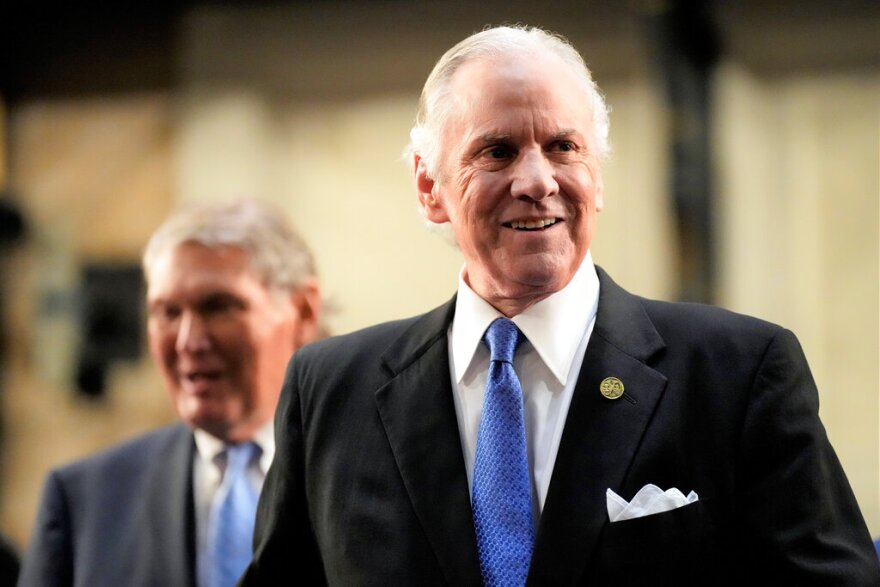Happy Friday.
You and we made it through Week 5 of the legislative session.
It's also Valentine's Day. So, after you read The State House Gavel, put down your phone and go tell everyone about how much you love The State House Gavel.
You're reading The State House Gavel, a daily reporter notebook by reporters Gavin Jackson, Russ McKinney and Maayan Schechter that will preview and capture what goes on at the South Carolina Statehouse this year while lawmakers are in session.
Notebook highlights:
- South Carolina economists gave a thumbs up to the state's economy on Thursday, and issued new revenue projections that House and Senate budget writers can use.
- A breakdown of what passed the House and Senate and what's on tap, as of Friday, for the week ahead.
- A Senate panel gave first approval to a DOGE-style bill, sending it to a full Senate Finance Committee.
- Gov. Henry McMaster says House Labor, Industry and Commerce did not give a fair hearing to Scout Motors. (And he was asked about the 2026 governor's race.)

Economists raise SC revenue projections
South Carolina's economy is humming along nicely.
That's according to state economists — known as the Board of Economic Advisors — who met Thursday to go over tax revenues and budget projections.
Frank Rainwater, South Carolina's chief economist, told the BEA that the economy is performing slightly better than expected and slightly above the pre-COVID economy.
He said the economy grew 2.1% over the first half of the fiscal year, and that tax revenues for January were $100 million above projections.
First, what does the BEA do? The small but very important group of economic advisors monitors state tax and fee collections and certifies what is usually a conservative forecast for general fund revenues. These numbers are used by lawmakers to craft the state's annual budget. Unlike in Washington, South Carolina's budget must be balanced so the General Assembly can only spend what the BEA says will come in.
So what did the BEA determine the tax revenues will be?
- $666 million in new recurring (annual) dollars (the jokes write themselves)
- $1.2 billion in non-recurring (one-time) dollars
You can find the full BEA report here.
What does this all mean?
It means South Carolina has a pretty healthy budget at around $14 billion in state general fund dollars, not accounting for state money already set aside and the federal money the state gets every year.
So, what's next?
The budget-writing process starts in the House, and, next week, the full House Ways and Means Committee will gather to go through spreadsheets and adopt a budget that will be sent to the floor for full consideration by the chamber in March. After, it goes to the Senate where the process sort of starts back over before the budget eventually heads to what's called a conference committee, or the negotiation phase.
Later Thursday, Rainwater told a Senate budget panel that while revenue projections show the state's economy is in fine shape, there's a few factors lawmakers really need to start considering as they look ahead:
- South Carolina is tied into a global and national economy.
- South Carolina's population is growing but it's also trending older and it could get tougher to find workers as people start to retire and the population turns to post-retirement.
- Corporate tax used to bring in around $500 million every year. It's now around $1.4 billion, but economists are concerned about an eventual economic drop, and corporate taxes would drop the quickest.
- Income tax revenue makes up about 50% of the general fund in the state budget (that's the pot of money lawmakers spend from).
- Revenue sources like beer, wine and liquor tax is declining.
 Jeffrey Collins/AP/AP
Jeffrey Collins/AP/APSouth Carolina Revenue and Fiscal Affairs Office Executive Director Frank Rainwater speaks to senators on Thursday, March 3, 2022, in Columbia, S.C. (AP Photo/Jeffrey Collins)
Bill breakdown and what's on tap for Week 6
A few bills of note moved on the floor Thursday.
Starting with the House:
- S. 253 now heads to ratification (when both the House Speaker and Senate President sign the bill before it goes to the governor) after the House gave its final OK. The legislation allows for the hiring of an independent compliance consultant to review the office of the state treasurer, comptroller general and state auditor — part of the recommendations outlined by outside audit firm AlixPartners when it audited the state over the $1.8 billion accounting error.
- H. 3523 passed the House 101-0. The bill would create the offense and penalties for organized retail crime. A similar bill died in conference committee last year though it passed both chambers.
Now the Senate:
- S. 28 passed the Senate 39-0. The proposal would increase the length of time a sex offender convicted of possessing child sex abuse material remains on the registry.
- S. 29, which would create the offense and definitions of possessing a morphed image of an identifiable minor, was given a unanimous third vote after it initially passed the chamber 40-0.
What's next on the calendar for both chambers?
To start, it's Friday and the General Assembly's meeting schedule gets updated throughout the weekend, into Monday. So this is not a complete summary of what we plan to see and cover next week.
Back to the House: As we mentioned above, the chamber's budget-writing committee will meet next week to work out the budget numbers before sending it to the floor and giving their other colleagues time to digest the legislation that is the size of a coffee table book.
The House cleared most of its calendar on Thursday, meaning more committee work needs to occur to get more bills on the floor.
And the Senate: With tort reform not quite on the chamber's calendar yet, more committee work is underway. The full Senate Medical Affairs Committee meets at 10 a.m. Thursday to debate, in part, S. 2, the health care consolidation bill that was foiled on the House floor in a procedural move in the last few minutes of session last year.

A favorable report for DOGE
A Senate Finance subcommittee gave the greenlight on Thursday to state Sen. Stephen Goldfinch's joint resolution proposal — S. 318 — that would create a nine-voting-member commission in the style of Elon Musk's federal DOGE efforts.
Of the nine members (none of which could be lawmakers):
- 3 appointed by the House Speaker
- 3 appointed by the Senate President
- 3 appointed by the governor
- A 10th non-voting member, who would chair the commission, would be named by the state Department of Administration. (Goldfinch says he'd like a Mike Shealy type. Shealy was Senate Finance Committee’s budget director for more than 20 years, and currently works in the administration department as the director of statewide leadership development).
Here's Goldfinch, R-Georgetown, describing the proposal below:
What's next: The proposal now heads to the full Senate Finance Committee, where we expect some more tweaks and amendments. Senate budget Chairman Harvey Peeler, R-Cherokee, is a co-sponsor of the joint resolution, giving the legislation a favorable outcome before it heads to the floor.
Meanwhile, in the House, which has its own DOGE-style bill, the chamber's assistant Democratic leader, Rep. Roger Kirby, R-Florence, called the push to install a DOGE-like commission "political optics."
Here's part of Kirby's comments to reporters:
Gov. Henry McMaster told reporters Thursday he supports efforts to create better efficiency in state government, mentioning his push to consolidate health care-related agencies.

McMaster hits House process over direct car sale bill
Gov. Henry McMaster says South Carolina is known by reputation for being a business-friendly state.
But a move Wednesday by a subcommittee of the House Labor, Commerce and Industry Committee to shelve a bill that would have allowed EV carmaker Scout Motors to sell its cars directly to buyers runs contrary to that image, he said.
State law prohibits car manufacturers from selling directly to customers, only through third-party auto dealerships.
Scout says it plans to roll out its first cars by the end of 2026.
Here's what the governor told reporters Thursday:
Reporters did also ask McMaster about the 2026 governor's race, a few days after 1st District Congresswoman Nancy Mace criticized Attorney General Alan Wilson from the House floor.
Mace and Wilson are both considering runs for governor.
Neither have officially announced.
McMaster declined to weigh in on Mace's fiery comments, calling both Mace and Wilson "friends of mine."
"I will let them fight that out," he said.

Statehouse clips from around the state
- What do these South Carolina students think about books being pulled from schools? (SC Public Radio)
- SC needs more electric vehicle charges. One state senator wants limits on who pays for them. (SC Daily Gazette)
- Auto dealers rev up pressure on SC lawmakers amid Scout Motors' EV direct sales push (Post and Courier)
- SCDNR board member receives Order of the Palmetto (WACH)
- Santee Cooper customers should expect a double cost hike in 2025 after years of frozen power rates (SC Daily Gazette)
- SC doctors seek conscience protections to provide abortions in federal lawsuit (State Newsroom)
- Disability access is a right under federal law. South Carolina is challenging that. (Post and Courier)
- Why is Donald Trump Jr jumping into a fight on a South Carolina Legislature bill? (The State)






